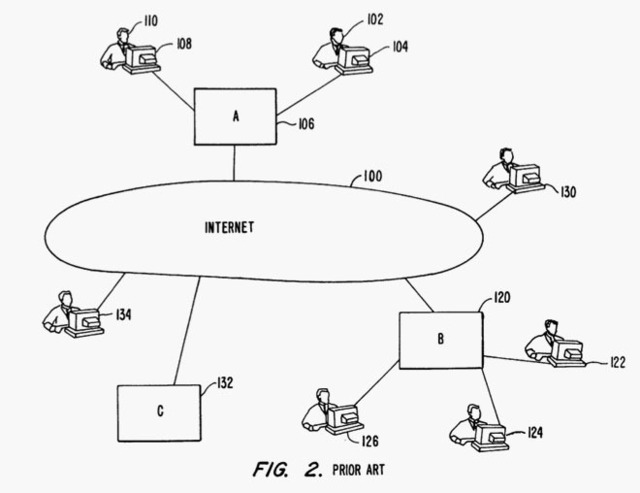 |
| From the Eolas Patent |
During the next few weeks a new patent is going to trial: US 5,838,906 - Distributed Hypermedia Method for Automatically Invoking External Application Providing Interaction and Display of Embedded Objects within a Hypermedia System. This seems like a pretty solid patent. Not a lot of voodoo or "prior art" being ignored.
This patent claims ownership over the concept of interactive, graphical web-based software. For example, the notion of "clicking on a video image" and having the video "play." Or going to a site that sells, for example, sweaters, and placing the sweater you wish to buy on a 3D model that rotates to show you how the sweater might look.
Now this is a big thing because, for example, all of YouTube relies on this because the little screen you see with the play button is the kind of "web object" the patent talks about - and the rest of YouTube matches the remainder of the description in the patent.
The patent is owned by a company called Eolas in Tyler, Texas, USA. The company is owned by a biologist name Michael Doyle.
Doyle has been successful in pursuing these types of patent cases in the past, winning a $521 million USD verdict against Microsoft (see this). Ultimately this case was settled out of court on appeal with an estimated settlement of around $100 million USD being paid to Eolas.
Needless to say this action has created the impression that Eolas is a "patent troll" merely attacking big pockets for cash.
However, in this case Eolas's claims are not without merit.
Many people, including Tim Berners-Lee, the inventor of the "internet" have testified in pre-trial hearings that the patent is "significant" in that its likely to be valid. People like Berners-Lee have also presented evidence of software that pre-dates the Eolas patent in an attempt to invalidate it.
Why this is all important is, of course, money.
Eolas is expecting to extract a significant amount of money from Google, Yahoo, and others.
This action, however, also affects the rest of "us" who use the web indirectly in that if companies like Google and Yahoo have to pay Eolas royalties then they will want to collect what they pay out from somewhere else - like you and I.
One of the problems with the US Patent system is that a company like Google cannot really find out if what they are doing violates a given patent or whether or not there even is a patent covering what they are doing.
While its perhaps "not fair" that a company cannot find out if its activities cross anyone else's patent. At the same time, these are big companies with billions of dollars, and it seems to me that they should be investing in this kind of research.
Similarly, companies like Eolas have followed the law and legally obtained these patents.
However, as usual, we as the "users" of the internet are left holding the bag.
The big companies, caught using patented technology, simply threaten to take away service others depend on.
I think that while Eolas is a "patent troll" I don't see them going after small fry. So perhaps if Google/YouTube doesn't like this they should use their friends in government to get the patent law changed.
Another interesting question is this: when something becomes so ubiquitous in society, e.g., YouTube, what happens when someone later comes along and claims full ownership?
No comments:
Post a Comment